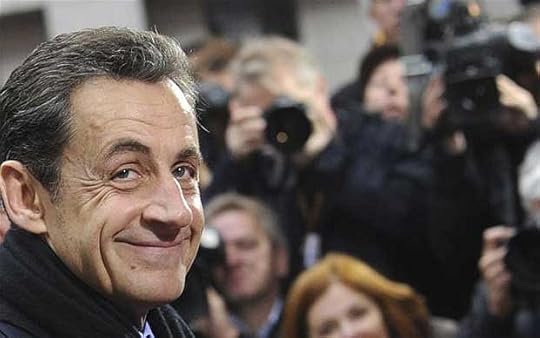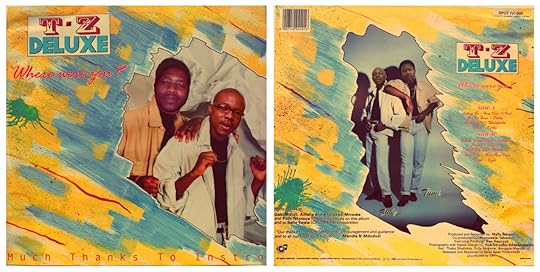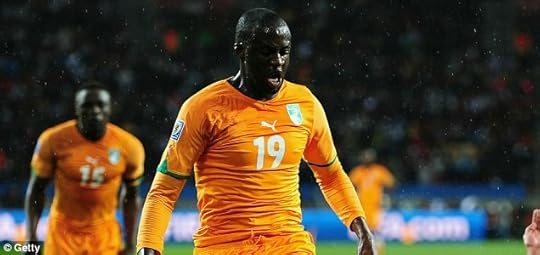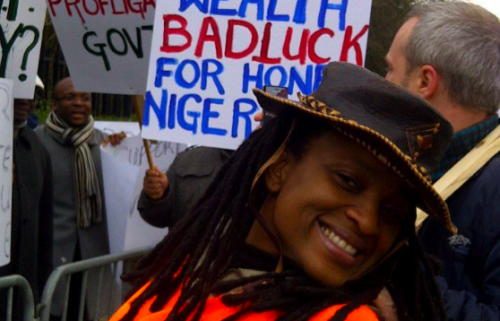Sean Jacobs's Blog, page 574
January 21, 2012
Africa is a Kickstarter
Two music related Kickstarter campaigns deserve your attention.
The above video is from The Nile Project, a campaign put together by Egyptian ethnomusicologist Mina Girgis, and Ethiopian-American singer Meklit Hadero. Meklit and Mina, based in San Francisco, are raising money to complete an international music collaboration based around the cultures of the Nile River. They've already lined up an impressive series of events including a floating band, a TED X event, and a world touring show, but they need your help to begin on their scouting trip to recruit musicians. Visit their page to donate.
Already almost funded is the Radio Tanzania project, focused on the Tanzanian Broadcasting Corporation in Dar es Salaam. In conjunction with Tanzania's celebration of their 50th year of independence, the state radio station is digitizing their archives to preserve Tanzanian cultural and political history. The campaign will also help fund a documentary about the preservation process including interviews with historical Tanzanian cultural figures.
And if you're still looking for something to give to, don't forget that Sorie Kondi is still trying to get to SXSW in Austin, Texas!








Paris is a Continent N°7

2012 will probably see Nicholas Sarkozy re-elected as French president, despite the poll surge of his far-right rival Marine Le Pen and the socialist candidate François Hollande. The Euro crisis, a recession, and high unemployment, makes Sarkozy very unpopular to voters now, but a combination of factors (he'll make rightwing noises on immigration and Muslims to woo rightwing voters away from Le Pen and the National Front; and Hollande's bad campaigning) will hand Sarkozy the presidency. My friends and the musicians we listen to, mostly the children of immigrants from Africa and the Caribbean, prefer Hollande and the Socialists, but know he won't win. We can't forgive Sarkozy for his behavior as Minister of the Interior in 2005 when he referred to rioting residents of the Parisian banlieues as "scum." Marine Le Pen, who hides her bigotry better than her father, has referred to Muslims praying on sidewalks as an "occupying army" and the banlieues resembling "tribal areas like in Pakistan." Most of the rappers I've featured already in this series make digs at Sarkozy and Le Pen (like L'Algerino for example). However, the most direct example of this kind of rap against Sarkozy, for me at least, is that by female rapper Diams.
It comes at the 3:00 minute mark when Diam's (mother French, father is Cypriot converted to Islam and married an Algerian), referring to Le Pen and Sarkozy, stops her rapping and addresses her audience: "I have a note for the President, as usual I have something to tell to the president: The President does not like us, I read it in his wishes, by the way he doesn't like himself either, I can see it in his eyes. I have the love in me, and very little hate which I reserve for few journalists of shit. And about Le Pen (Marine) I'll try to be polite. Ladies and gentlemen, if you don't like us, go look elsewhere, because we'll stay and we'll take what we have of this country …"
A close second is Joey Starr's track "Sarkozy." This song was supposed to be on his new album but he was forbidden to include it because the CSA [Conseil supérieur de l'audiovisuel; the French media regulating body] decided it was "too insulting against Sarkozy." There's a line in here reminding Sarkozy "you're nothing but an immigrant" (referring to his Hungarian father) — an immigrant like us.








Mixtapes and Megaupload

I was going to post the link to Das Racist's latest offering too, the funny, irreverent and poignant 'Nehru Jackets' by Heems AKA Himanshi Suri, unofficial leader of the NYC rap group, but the FBI has just shut down the file sharing site Megaupload (which Heems used to post his free mixtape). Apparently Megaupload has been accused of pursuing a business model based on copyright infringement. This comes after a week of high profile protests against the proposed Stop Online Piracy Act (SOPA) and the Protect Intellectual Property Act (PIPA). Interesting times indeed. But we have two awesome mixtapes ready for download for the weekend.
First up is a collaboration between South African MC Tumi (from one of my favourite bands ever, Tumi and the Volume) and Zubz. The mixtape, entitled "Where were you," is a nostalgic tribute to Kwaito, the genre that captured the jubilation of South Africa's transition to democracy in the 90′s. Basically, Tumi and Zubz took some of the biggest kwaito hits and laid some verses over them. For those not familiar with the genre, it's a great recap of what you missed. Download the mixtape here.
Second up is DJ Obah's brilliant, high energy "Hey Mama" mixtape, part of the Africa in Your Earbuds mixtape series by Okay Africa. It's mostly a collection of American tracks or artists that have been inspired by the continent, including some African classics. The highlight for me has to be Mulatu Astatke's Yegelle Tezeta mixed with the hip hop track that went on to sample it, 'As We Enter' by Nas and Damian Marley. Download link here.








January 20, 2012
Friday Music Bonus Edition
Let's do a Friday Diaspora edition. There are some half-baked attempts at linking the videos in here. But don't take them too seriously. French-Congolese Youssoupha takes on living in France in 'Irréversible':
Also residing in Paris these days is Togo's YaoBobby. His 'Afrique Enchantée' comes with French lyrics:
The use of split-screen faces in music videos, in vogue in the diaspora and possibly with a second meaning, we also found in the video for 'The Village'by Trinidad-Canadian Ian Kamau (he has a great music blog and we featured him here before):
Somali-Canadian K'naan (remember his World Cup days?) got a lyric video out for 'Nothing to Lose', a collab with Nas (what's the latest news on Nas's promoters in Angola and what's up with his "Yo my Somali niggas know what war be"?):
Finally, UK-based Nigerian eL Flaco does a rap job a bit different from K'naan and Nas. His 'Mind Move' comes off last year's Samurai Series:








'Mama Africa,' the film
We suspect there's a good chance this video would have been taken down by now if the proposed #SOPA law would have been passed. But since #SOPA's not here yet: it is a recording (and an edited-down version) of the 2011 documentary by Finnish director Mika Kaurismäki about the life of Miriam Makeba.

The African Cup of Nations preview

The 28th edition of the African Cup of Nations kicks off in Gabon and Equitorial Guinea tomorrow. 16 teams–including the joint hosts who did not have to qualify–will play for 2 places in the final match scheduled on February 12. The big question is, of course, who will take the trophy.
Well, based on the objective measure of FIFA's latest World Rankings, the top two African countries are: Cote D'Ivoire (ranked 18th in the world) and Ghana (ranked 26th). Either of these two should be favorites to win the tournament. The next two African teams on the rankings, Algeria (32th) and Egypt (36th), did not qualify for the tournament. Senegal, the fifth highest ranked African team in the world at number 43, did qualify and is the favorite of most fans, some English football writers (who like Newcastle) and on this blog. We predict that the player of the tournament could be Ivorian Yaya Toure. (Our predictions come with a health warning though.)
I'm still trying to figure out how to watch it. American sports channels have never showed the finals live. I'll probably buy some package online, like I've done with the last tournament played in Angola.
Not everyone is looking forward to the tournament of course. Jonathan Wilson in The Guardian asked whether African football is progressing. He concludes no, though he never really tells us why. (Read it for yourself.)
Anyway, back to festivities. VOA's Sonny Young writes on his blog that a few artists have made tournament specific songs and music videos to go with it. Including Jon Loo K of Gabon's "Africa Shootez Ballon" and Togolese duo Toofan's "Africa Hooyee," which we agree could be the musical hit of the tournament:
Of course The Elephants will have the last word. Tom pointed me to this song in honor of les Eléphants by Le Magnific.

AIAC talks #OccupyNigeria with novelist Chika Unigwe

In what is now a standard for political struggles on the continent, the Nigerian diaspora — with a more direct stake in what happens back home — have been key to keeping attention on the political crises back home. One of these has been the novelist Chika Unigwe who has been living in Belgium for over thirteen years. A charter member of the new generation of Nigerian writers — her second novel, "On Black Sisters' Street," was published in English in 2009 to good reception in the mainstream Western press. Back in Belgium, her 2005 novel De Feniks (The Phoenix) is marketed on her website as 'the first book of fiction by a Flemish author of African origin.'* Unigwe has been a remarkable presence in mainstream media, particularly in Europe, over the past two weeks, fronting Nigerian diaspora protests while feverishly linking back to 'occupy protesters' in Nigeria. So we asked her about the visibility of artists and entertainers in #OccupyNigeria, what media she checks to keep up with the protests, who are the "dissatisfied young people," what role do social media play, and how do political leaders (apart from "Badluck" Jonathan and his irritable finance minister) stand to benefit or lose from their stance on the protests.
You live in Belgium. You have made Belgium your home. How do you look at what is happening in Nigeria at the moment?
If home is where the heart is, then Nigeria is more of a home to me than Belgium where I have lived for over thirteen years. I've never been able to disengage form Nigeria, not mentally at least. What's happening in Nigeria at the moment is a revolution of sorts, led by a generation that's been let down, royally, by the government, and who feel that they have nothing else to lose.
The removal of the fuel subsidy (and its consequences) was the straw that broke the camel's back but it's not the only reason why people took to the streets to protest against a government that seemed increasingly blind to the sufferings of the common man. What the removal of the fuel subsidy did was to awaken Nigerians that the time to demand change was in the present, not in the future. Even those who did not know the finer details of the subsidy removal knew that they were suddenly paying two, three times more for commodities in the space of 24 hours. The protests gave everyone a chance to show, and to articulate their anger at the way the country was being run. The Occupy Nigeria protests were about asking for a more responsible government. They were about asking for greater accountability from our leaders.
Never before had Nigerians poured out all over the country, and in the diaspora as well, to protest against a government. Never before have Nigerians taken a huge interest in where and how the country's wealth is being disbursed. Everyone knows the breakdown of the 2012 budget. Whereas before people felt distant from the 'government', many felt hopeless against this faceless 'government', now we, ordinary Nigerians, feel that we can have an impact. We feel that the street too has power. And hopefully we have awakened the government to that fact too.
Fronting the protests in images and reports we got to see on the web were artists and entertainers (musicians like Seun Kuti, Nollywood actors…) while international media were quick to publish op-eds by or to do interviews with Nigerian authors about Occupy Nigeria (Chimamanda Adichie in the NYT, Okey Ndibe for Sahara Reporters, Wole Soyinka on the BBC and Chinua Achebe in the CSM). How much 'weight' do these figures actually have in Nigeria, for "the common man," as you refer to the protesters?
When I say the common man I am using it very loosely, and in essence very broadly too to define anyone outside of the government. Protests in Lagos had Funmi Iyanda, a celebrated documentary maker and social activist, Femi Falana, Seun Kuti and so on on the streets alongside market traders and mechanics. So these figures are also 'common men' and they have articulated our protest to the wider world. They have credibility in Nigeria as well regarded writers, and their pieces in international media supplement (and complement) the efforts of those on the streets. They go hand in hand. In a way they are 'occupying' too. And they 'are' occupying in the present tense as it's still very much a part of us.
Your observation about the 'present tense' made me re-read Nkem Ifejika's BBC piece. "This was [the dissatisfied young people's] movement. While the unions were prepared to accept a compromise of 97 naira (about $0.60; £0.40) per litre, young people wanted much more." Who are the "dissatisfied young people"? And how do they relate to the Unions?
I suppose what Nkem means by it being a "dissatisfied young people's" movement is that it was spearheaded mainly by young people. The same young people who feel the most let down because through the Enough is Enough movement, they campaigned for Goodluck to take over while [former President] Yar Adua was ill (and when he eventually died). Goodluck is the first Nigerian president with a PhD. A lot of people were excited by this, particularly young people who saw in him the potential for a different kind of leadership.
The Nigeria Labour Congress (NLC) and the occupiers have different goals as far as I can tell. The NLC's focus was on reducing the fuel subsidy and once they reached a compromise with the government, they were willing to put an end to the strikes. It should be noted that the NLC also came on board only after the OccupyNigeria movement had started.
In another piece (for CNN), Tolu Ogunlesi briefly refers to the internet as providing "a platform for the accumulation and direction of the anger and frustration. While it may be true that the internet is currently being used only by a minority of Nigerians, it appears that that minority is more significant than we all assumed." If it is only a minority using the internet, whose opinions about the protests are we reading in the popular social media? And again: who, then, are "the dissatisfied young people"? Does that "minority" reflect "the young people"? Is it a dissatisfied middle-class youth? Any-class of youth?
Whose opinions are we reading on social media? The opinion of those with access to computers and the internet. Cyber cafes are very popular in Nigeria and so I am wary of ascribing quantity to the group with access to social media. Don't forget that for a very long time, cyber cafes in Nigeria have been notorious for being hang-out areas for (young) people involved in internet scams. Many of these people are not middle class.
However, the success of the Occupy Nigeria movement is that it managed to go beyond the cyber world. People with access to social media mobilized people without. Word was passed from ear to ear. I spoke to an acquaintance in Nigeria recently who has no access to a computer but who went out to protest because her neighbor recruited her. So even if those with access to social media are mostly middle class, the young people protesting on the streets come from every social strata. The anger, the very palpable anger on the streets is that of a generation united by a sense of betrayal by their government, rather than of a particular class of young people.
On that note: watching and reading up on #OccupyNigeria, I tend to gravitate to the local and international channels that get the most buzz. What are your sources to stay up-to-date on what is happening? Which websites, blogs, or papers are providing the best coverage?
Sources I've found useful (on twitter/facebook and from personal conversations) include (but are not limited to): Tolu Ogunlesi, Funmi Iyanda, Chude Jideonwo, Jeremy Weate, Elnathan John (I chat with him almost on a daily basis), Kayode Ogundamisi (who also has a blog), YNaija (and the blog), Nigerian online papers Sahara Reporters and UReports (atrocious grammar but mostly up to date) and Nigeria News Desk.
What do you make of Governor Babatunde Fashola (who is considered something of an exception among Nigerian political leaders) and his dealing with the angry protests?
Before now, Fashola was a popular governor. Yesterday there was a peaceful protest and protesters were dispersed by tear gas. Very, very unfortunate. However Fashola has denied that he asked for a deployment of soldiers to Lagos. A statement I find unusual. He also can't claim not to know about the dispersal by the police in yesterday's incident. How can a troop of soldiers occupy a city and the governor of the state say he has no hand in it? Either he is lying or Nigerians are living under a dictatorship.
With Fashola sending out mixed messages, who will be able to rise above the protests? Which Nigerian politicians should we be paying close attention to in the near future? In other words: where to from here?
This is one area I am very wary of speculating on. It is my feeling — and many people's too — that some politicians are capitalizing on this, riding on the peoples' dissatisfaction to worm their way into our good books. However I think that of all the opposition leaders, Pat Utomi who has been very active in the movement, and who was leading a group of other activists to protest against the deployment of troops in Lagos yesterday, has the most good will. Will that mean much in 2015? We shall have to wait and see.
* In 2012, I think it's fair to say there haven't been published that many more books by Belgian 'African' authors apart from hers — there is the work by Nadia Dala and Rachida Lambrabet, but that's pretty much it. We'll write about this another day.

A cappella colonial mentality
Blitz the Ambassador, a staple on AIAC, has been releasing these videos (titled "Koshka Sessions") where he eschews his big band and accompanied by only a percussion instrument delivers raps like this one "Colonial Mentality." This is number 3, the latest, in the series.
Here are links to sessions one and two.

January 19, 2012
Music Break. Alabama Shakes
Remember the Alabama Shakes–the best band of 2011. At the heart of the band is guitarist and singer Brittany Howard, described by my wife as "a cross between Janis Joplin and Amy Winehouse" when we saw them performing live in early December at the Mercury Lounge in Manhattan. Probably the best live gig I've seen in a while. At the Mercury Lounge we stood for long periods just staring at Howard working the mic. The rest of the band can play too. Anyway, in the video above you can see another one of Alabama Shakes more recent live performances–and Howard's talents as a performer–captured on video. Go see them before they're really famous.

The excitement about 'African fabric'
[image error]
The Dutch fabrics manufacturing company Vlisco says its "strategy is aimed at enabling well-to-do African women to experience the brand in all her facets … Developments take place at neck-breaking speed in Africa and Vlisco aspires to inspire and gain the loyalty of younger generations as well. Innovation is therefore an essential element within the company."
Of course, innovations in cloth making/print making has made the world go around but…mass-producing cloth in Europe, and selling it to "the colonies" is nothing new.
"Dutch" wax print was based on batik print techniques from the colonies in Indonesia and other parts of the Indian Ocean world, into which the Dutch East India company sent warships in order to take over trade. In the Netherlands, the batik techniques were simplified and adapted, using machinery, eliminating the finesse with which the original cloth was made. The result: cheap, mass produced stuff, which was eventually pushed on foreign markets. Although it is not known how exactly this mass-produced, patterned cloth arrived in Africa, it's commonly thought African soldiers recruited by the Dutch (known as the 'Belanda Hitam', or 'Black Dutchmen') and stationed in the East Indies returned to West Africa in the nineteenth century bringing along batik fabrics…and a new clientele was born. And because the mass produced material were not popular in Indonesia, the Dutch may have had to attempt to find new markets.
What is now commonly called "African fabric" goes by a multitude of names: Dutch wax print, Real English Wax, Veritable Java Print, Guaranteed Dutch Java, Veritable Dutch Hollandais. This is not to say that Africa never invented anything – but to illustrate that in Africa, as in any place where identity, objects, and concepts of taste and beauty are influenced by trade, was (and remains) in flux. In other words, there is no such thing as an "essential" African look or way of being. In fact, Yinka Shonibare, the Nigerian-British contemporary artist, has famously used this signature cloth, traditionally associated with the imagery that "Africa" conjures up, to fashion dresses fit for European madams of the Victorian Era (see his "Gay Victorians"): it's a sly, surreal critique of the residual colonial views imprinted in all our heads.
That new innovations in print making is bringing finer cloth and designs to West Africa is wonderful. And it's sweet that a number of major design houses, including Michael Kors, Burberry and Oscar de la Renta used African prints and motifs in 2011. But as Dolapo Shobanjo, owner of the online boutique, MyAsho.com, which sells clothes by African designers said in a recent interview with NPR: "I grew up in Nigeria and this is something that I've seen before. I've seen people use African fabrics and I've seen…designers be creative with the fabric. So it's quite interesting to have seen the Western world kind of embrace this new fad and have editors kind of…market it as, you know, fresh and new and amazing."
Listen to the interview on Tell me More on NPR here.

Sean Jacobs's Blog
- Sean Jacobs's profile
- 4 followers







